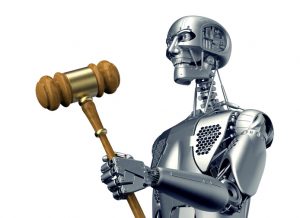Running With The Robots At Legalweek
AI isn't some sort of farfetched technology of the future; it's technology that lawyers can take full advantage of today.
 After a whirlwind of meetings and lots of legal tech talk, Legalweek 2018 has come and gone. This year was the second iteration of ALM’s recently revamped conference. I agree with the assessment of my fellow Above the Law legal technology columnist, Bob Ambrogi, that this year’s Legalweek conference felt a bit smaller than the Legaltech conferences of year’s past, but the revamped concept is undoubtedly beginning to gel in its second year.
After a whirlwind of meetings and lots of legal tech talk, Legalweek 2018 has come and gone. This year was the second iteration of ALM’s recently revamped conference. I agree with the assessment of my fellow Above the Law legal technology columnist, Bob Ambrogi, that this year’s Legalweek conference felt a bit smaller than the Legaltech conferences of year’s past, but the revamped concept is undoubtedly beginning to gel in its second year.
Before the conference, I spoke with John Stuttard, then-Senior VP of Global Events at ALM, and he explained that the conference was re-branded and revised with the end goal of expanding the topics covered in order to appeal to a broader audience — and I’d say that they’re succeeding. This year’s conference definitely felt a bit livelier and seemed to veer away from the Legaltech Groundhog Day-like experience of being trapped in a never-ending loop of eDiscovery drudgery.
Needless to say, it was a welcome change, as was the increased focus on AI and its application to the legal industry. This trend was apparent throughout the conference, as evidenced by the AI Bootcamp Workshop on Monday, and the virtual brawl, of sorts, between Casetext and Ross Intelligence regarding the similarities (and differences) between their AI-enabled brief analyzers. (Casetext’s CARA has been around for some time now, while Ross’s EVA was just released at Legalweek.)

Navigating Financial Success by Avoiding Common Pitfalls and Maximizing Firm Performance
While at Legalweek, I sought out opportunities to discuss AI and learn about companies that were incorporating machine learning into their software. When I met with Patrick Fuller, Vice President of Legal Intelligence at ALM Media, we agreed that there were three areas where AI showed lots of promise in the legal industry: 1) litigation analytics, 2) legal research, and 3) contract review. During my meetings throughout the rest of the conference, these themes surfaced again and again.
For starters, I spoke with Darby Green, the Commercial Director for Litigation and Bankruptcy at Bloomberg Law. I was pleasantly surprised to learn that Bloomberg Law had released AI software in all three categories: litigation analytics, legal research, and contract analysis and review. She explained: “For legal research, Points of Law pulls out the connections between cases and finds out the essence of what a judge says. Litigation Analytics looks at companies, law firms, and judges and makes connections to help you identify litigation strategies and best practices. Draft Analyzer will help you pull out different clauses and see … different templates from different law firms and try to find the best language for you and redline where there are differences… Essentially, AI is a tool to help lawyers be more effective at their jobs.” You can watch the entire video of the interview here.
I also met with members of the Relativity team, including Jeff Gilles, Solutions Architect. I learned about several enhancements to RelativityOne, their cloud eDiscovery platform, including the availability of transcript support and an active learning workflow. Then we turned to AI and Gilles shared his thoughts on the trust barriers often encountered when lawyers consider using AI software. According to Gilles, “People first need to acknowledge the flaws of their current processes … and that sometimes when the machines have flaws, they’ll be different flaws than what the people have.” You can watch the full interview here.
I also had an interesting discussion with Justin Hectus, Chief Information Officer at Keesal, Young, and Logan, who shared some innovative steps the firm was taking to improve and streamline the collaboration process with clients, including expanding its relationship with the legal workflow automation provider ThinkSmart. I asked him what client-centric service means in 2018, and he replied, “The best interests of the client … means a lot of different things that sometimes results in product, sometimes results in consultation, and a whole suite of services that don’t fall under the traditional umbrella of legal services.” Watch the full video interview here.
Sponsored

Navigating Financial Success by Avoiding Common Pitfalls and Maximizing Firm Performance

Legal AI: 3 Steps Law Firms Should Take Now

Is The Future Of Law Distributed? Lessons From The Tech Adoption Curve

Legal AI: 3 Steps Law Firms Should Take Now
Next I met up with Michael Swarz, Marketing Manager at Veritone, which is a really interesting company that provides AI-powered software that searches audio and video content and provides data regarding sentiment, content, and facial recognition for litigation and compliance purposes. Veritone announced a new integration with Relativity and Swarz explained that the integration makes it possible for litigators to use the software to quickly and seamlessly “translate, transcribe, redact, and find objects” in videos.
I also discussed the impact of AI on the legal industry with Paul Domnick, President at Litera Microsystems. Paul explained that the company was the result of a fairly recent integration between Litera, Microsystems, The Sackett Group, and XRef, providing an end-to-end solution that streamlines the entire document drafting cycle — thus simplifying their customers’ experience. Their customers no longer have to manage multiple vendors, since Litera Microsystems provides all-in-one document drafting software. This all-in-one focus is an emerging trend in 2018 and experts are predicting that you’ll no doubt see more of this in the months to come.
I asked Domnick how AI would impact the delivery of legal services and this was his response: “The true impact is going to come down the track when we have AI built into everything we do. We probably won’t think of it as an AI revolution. You’ll wake up one day and realize it’s in almost every solution you’re using across the firm.” Watch the full interview here.
And last, but not least, I talked to Shmuli Goldberg, Vice President of Marketing at Lawgeex, software that provides AI-powered contract analysis and review. He shared how he thinks lawyers’ perspectives about AI and emerging technologies have evolved over the past year: “There’s still a group of lawyers saying that tomorrow’s lawyers will look like this, and AI will let us do this, but there’s now a much larger group … saying we’re doing this today. This is today’s lawyer … and we’ve been doing this for a year now and here are our results — they’re quantitative and not theoretical.” You can watch the full interview here.
In other words, AI is already here. This was readily apparent to me as I conducted my interviews and traversed the Expo Hall floor. AI isn’t some sort of farfetched technology of the future; it’s technology that lawyers can take full advantage of today. It’s readily accessible, affordable, and getting better everyday. The future is here, and it’s an exciting time to be covering legal technology. And I, for one, can’t wait to see what the rest of 2018 will bring!
Sponsored

Early Adopters Of Legal AI Gaining Competitive Edge In Marketplace

The Business Case For AI At Your Law Firm

 Nicole Black is a Rochester, New York attorney and the Legal Technology Evangelist at MyCase, web-based law practice management software. She’s been blogging since 2005, has written a weekly column for the Daily Record since 2007, is the author of Cloud Computing for Lawyers, co-authors Social Media for Lawyers: the Next Frontier, and co-authors Criminal Law in New York. She’s easily distracted by the potential of bright and shiny tech gadgets, along with good food and wine. You can follow her on Twitter @nikiblack and she can be reached at niki.black@mycase.com.
Nicole Black is a Rochester, New York attorney and the Legal Technology Evangelist at MyCase, web-based law practice management software. She’s been blogging since 2005, has written a weekly column for the Daily Record since 2007, is the author of Cloud Computing for Lawyers, co-authors Social Media for Lawyers: the Next Frontier, and co-authors Criminal Law in New York. She’s easily distracted by the potential of bright and shiny tech gadgets, along with good food and wine. You can follow her on Twitter @nikiblack and she can be reached at niki.black@mycase.com.








